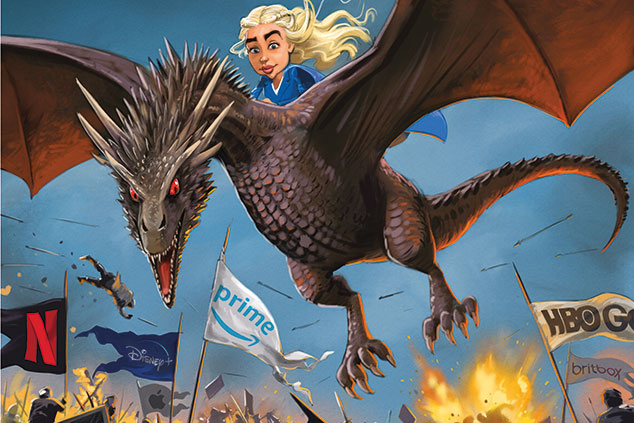
Television is undergoing profound change as the battle for popular programmes intensifies. Which producers and streaming platforms will win the content war? Tim Dams assesses the market.
A night on the sofa watching television used to be a straightforward affair. With just a few channels, the choice was strictly limited and often rubbish – maybe a soap, a lifestyle show, or a new BBC or ITV drama. Nowadays, just choosing what to watch can be an exhausting process in itself. Hours can pass by flicking between multiple channels provided by pay-TV (satellite or cable) companies, streaming platforms such as Netflix, Amazon and Now TV (which deliver their programmes over the internet), or catch-up services such as BBC iPlayer or All 4. The familiar complaint now is that there’s just too much good stuff on telly, and that it is a struggle for many viewers to keep up with the latest must-see dramas such as Killing Eve, Chernobyl, Game of Thrones, or Stranger Things.
Why we have so much choice
This surfeit of choice is the result of profound changes in the television industry. More programmes (“content”) and platforms are now being delivered “over the top” (OTT) to screens via the internet rather than over a limited broadcast spectrum, or through one or two powerful satellite or cable companies.
Companies such as Netflix and Amazon have ploughed millions into producing new shows or buying up libraries of content for their OTT streaming platforms in order to entice customers. Netflix alone is reported to be spending £15bn on content in 2019. The strategy has certainly attracted subscribers: Netflix now has 152 million globally. But it has also prompted a content war in the TV industry, with many existing players stepping up their investment in programmes so they can compete with the new entrants. For example, pay-TV service Sky, bought by Comcast last year, said last month that it would more than double its spending on original programmes to over £1bn a year by 2024.
A golden age of television
Not only is more content being produced, but the rising demand is rapidly boosting programme budgets. Tom Harrington of Enders Analysis says that the cost of drama has jumped by 40% in five years. Today’s content war has led to a golden age of viewing for TV fans, good news (or bad news for those feeling overwhelmed) – but the choice is going to get even wider. New streaming platforms are set to launch from the likes of Apple, Disney and WarnerMedia. All have been investing heavily in an array of shows for their new services as they look to take on Netflix and Amazon. Disney, for example, expects to spend $1bn on original programming solely for its Disney+ service. By 2024 this figure is to reach $2.5bn.
Subscribers can read it in the digital edition or app